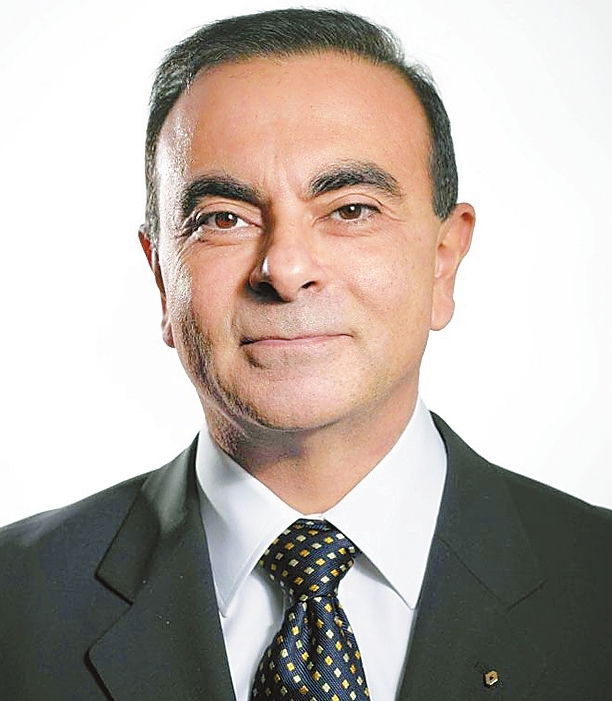

IN his 40 years in the auto industry, the praise Carlos Ghosn has won for turning around businesses has regularly been matched by criticism over the amount he has been paid to do it. In the latest furor over his finances, Japan’s Nissan Motor Co. said Monday it planned to oust Ghosn as chairman after alleging he had made personal use of company assets, among other acts of suspected misconduct. Brazilian-born, of Lebanese descent and a French citizen, Ghosn began his career in 1978 at tiremaker Michelin before moving to Renault in 1996, where he oversaw a turnaround at the French automaker that won him the nickname “Le Cost Killer.” He was later sent to rescue Nissan and Mitsubishi in Japan. Ghosn’s status as an outsider in Japan brought him huge success, as his maverick style blew a gale through a musty corporate world. He was once so embraced as the savior of a once-stumbling firm that his life was made into an inspiring manga comic. Until this week’s dramatic events, the storyline had been one of almost unbounded optimism. “Ghosn is likely the most successful foreign chairman in Japan,” said Kosuke Sato, a senior economist at the Japan Research Institute. “What he did was unprecedented in Japanese corporate history.” But that narrative was rapidly unravelling by Monday evening. At a news conference hours after Ghosn’s arrest, his hand-picked successor as Nissan CEO offered a revisionist history that minimized the role played by Ghosn in the automaker’s turnaround. Hiroto Saikawa also referred to the “dark side” of Ghosn’s tenure, suggesting he had accrued too much power and had become far removed from the daily operations of the firm. And he pointedly declined to offer the deep bow of apology that has become a standard part of any press conference involving a Japanese company acknowledging misdeeds by staff. Japan’s media, who once fêted Ghosn for his role in resurrecting Nissan and reviving the country’s auto industry, also pounced. The financial Nikkei daily noted he had failed to cut short his holiday when an inspection scandal at Nissan broke in 2017, and the Yomiuri Shimbun described Nissan executives calling Ghosn “greedy.” “He says the right things, but in the end it’s all about money,” the daily quoted employees as saying. Corporate scandals are nothing new in Japan, but a case apparently centered on personal enrichment has left a bitter taste. “Ghosn is a victim of his own hubris and success,” said Jeff Kingston, director of Asian Studies at Temple University Japan. “He was lionized for bursting through Japan’s fusty corporate culture, taking no prisoners, and now he is paying the price. “He trampled on Japanese cultural norms with his flamboyant glory-hogging ways, and his massive compensation incited jealousies and invited retaliation,” he said. His salary was enormous by Japanese standards and drew criticism even at the government level in France. “He certainly made enemies and was envied in the Japanese establishment because in a sense he breached the norms of CEO compensation,” said Robert Dujarric, director of the Institute of Contemporary Asian Studies at Temple University Japan. “Ghosn also had a CEO lifestyle. The major Japanese bosses are more discreet,” he added. Whether in the aggressive restructuring or his decision to celebrate his marriage to his second wife with a Marie Antoinette-themed party at Versailles, Ghosn was the antithesis of the low-key persona of his peers in Japanese firms. It is not the first time Ghosn has gotten into hot water over pay, in particular a combined salary that makes him one of the highest-paid CEOs in France and one of the best-paid foreign executives in Japan. Last year he denied a report the alliance was planning to pay hidden bonuses to its executives by setting up a company in the Netherlands. And in February the French Government, which owns a 15-percent stake in Renault, forced Ghosn to accept a 30-percent pay cut from the 7.25 million euros (US$8.3 million) he took home as Renault CEO last year, calling the amount “excessive.” The government had already put its foot down in 2016, joining with 54 percent of voters at Renault’s annual meeting in refusing to authorize a 7.25-million-euro pay package. The vote was overruled by Renault’s board, but Ghosn later accepted a pay cut after Emmanuel Macron, France’s finance minister at the time, threatened to step in with a new compensation law. “Compensation is more scrutinized today than in the past,” Ghosn told The Financial Times in June, but added: “You won’t have any CEO say, ‘I’m overly compensated.’” Ghosn has long stood out among the world’s auto executives as a hard-nosed workaholic willing to take drastic measures to get companies back on their feet quickly. Ghosn began his career with the tire-maker Michelin and, after a early stint in Brazil, was quickly promoted and earned a reputation for turning around its North American operations. From there, he was recruited by Renault in 1996 to work alongside then-CEO Louis Schweitzer, where he helped return the company to profitability by making the former state-owned carmaker leaner and more efficient. Just three years later, he was sent to head the newly acquired Nissan group with the challenge of doing the same thing within two years. He managed it within one. The performance made him a hero in Japan, where the suave businessman is known for always being up before dawn after just six hours of sleep a night. “A boss has to have 100 percent freedom to act and 100 percent responsibility for what he does. I have never tolerated any wavering from that principle, I will never accept any interference,” he once said. After restoring Renault and Nissan to sound financial footing — in the process shedding thousands of jobs at each company — Ghosn quickly shifted into higher gear by pressing hard to develop electric cars. More recently he has been focusing on reviving Mitsubishi, which secured a lifeline in 2016 from Nissan after it bought a 34-percent stake. As head of the Renault-Nissan-Mitsubishi alliance, Ghosn has created an industrial behemoth, its combined 470,000 employees selling 10.6 million vehicles last year from 122 factories around the globe. He became CEO of Renault in 2005, chairman of Nissan in 2008 and chairman of Renault in 2009, giving him considerable sway over both companies. France’s Finance Minister Bruno Le Maire said Tuesday Ghosn should not remain in charge of Renault after his arrest in Japan. Crossing borders and adapting to different cultures have never been a problem for Ghosn. Born in Brazil on March 9, 1954 to Lebanese parents, he was reportedly able to distinguish types of cars at the age of 5 just by the sound of their horns. At the age of 6, he went to live in the Lebanese capital Beirut with his mother and attended a Jesuit high school there. Later he moved to Paris where he picked up degrees at two of France’s most elite schools, including the Polytechnique engineering university. His Portuguese, Spanish, Italian, French and English are fluent, and he has picked up a working knowledge of Japanese during his time at Nissan. Yet he also fiercely guarded his personal time and maintains his ties with Lebanon, where he has invested in a winery. “I do not bring my work home. I play with my four children and spend time with my family on weekends,” he once told Fortune magazine. “When I go to work on Monday... I come up with good ideas as a result of becoming stronger after being recharged.” The fall of such a high-profile outsider comes as Japan wrestles with addressing longstanding labor shortages by bringing in foreign blue-collar migrant workers. Economist Sato said the Ghosn case illustrated a fundamental culture clash in Japan’s corporate sector. “After this case, Japanese companies may hesitate to accept foreign leaders in the future.” And that, said Jenny Corbett, of the Foundation for Australia-Japan Studies, would be a pity for Japan. “After Ghosn, it may be that the companies that need that kind of shakeup will be more nervous about bringing outsiders to do that.”(SD-Agencies) | 
